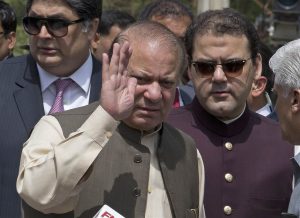 In Pakistan, prime ministers are not known to complete their full terms due to the perennial power tussle between the elected civilian government and the all-powerful military, which is always itching for a chance to prove who runs the show in this country? This time round, however, Nawaz Sharif’s route to ouster has been through judicial intervention in a high-profile corruption case, which some critics are already dubbing as a “judicial coup.”
In Pakistan, prime ministers are not known to complete their full terms due to the perennial power tussle between the elected civilian government and the all-powerful military, which is always itching for a chance to prove who runs the show in this country? This time round, however, Nawaz Sharif’s route to ouster has been through judicial intervention in a high-profile corruption case, which some critics are already dubbing as a “judicial coup.”
Pakistan’s Supreme Court’s disqualification of Prime Minister Nawaz Sharif from holding public office and barring him from electoral politics for five years has not only reignited power tussles in a deeply fractious system and threaten to plunge Pakistan into prolonged instability, but is also not good news for the region and India.
The investigation into the Panama Papers concluded that Mr Sharif was guilty of not disclosing his family finances in offshore accounts that emerged in Panama Papers leaks. The Pakistan Army has predictably denied any meddling in the Supreme Court’s decision.
For Pakistan, Mr Sharif’s ouster and judicially-sanctioned political exile means more volatility and a blow to democratic forces in the country. Mr Sharif’s PML-N remains hugely popular and a formidable political force in Punjab, and his ouster is not going to change that despite the military’s bid to position Imran Khan as the challenger.
For now, Mr Sharif has proposed Punjab his brother and Chief Minister Shehbaz Sharif as the party’s candidate for prime minister and that Shahid Khaqan Abbasi, former Petroleum Minister and a staunch loyalist, will be the interim candidate until Shehbaz Shasrif is elected to a National Assembly seat.
Sharif and India
 What does Sharif’s ouster means for India and India-Pakistan relations? Mr Sharif, for all his faults, tried improving relations with India, especially economic ties, and even risked alienating the military by accepting India’s Prime Minister Narendra Modi’s invitation to come to Delhi for his swearing-in ceremony in May 2014. But as his rivalry with the military establishment in Rawalpindi sharpened, Mr Sharif allowed his incipient peace initiative to be hijacked by drumming up the Kashmir cause, thereby providing space to the military to fuel unrest in the Valley and set the agenda vis-à-vis India. Insiders and analysts say that Mr Sharif’s Kashmir overkill was his way of appeasing the powerful generals, but in the end Rawalpindi has prevailed, with the Supreme Court willingly playing into the hands of the military establishment.
What does Sharif’s ouster means for India and India-Pakistan relations? Mr Sharif, for all his faults, tried improving relations with India, especially economic ties, and even risked alienating the military by accepting India’s Prime Minister Narendra Modi’s invitation to come to Delhi for his swearing-in ceremony in May 2014. But as his rivalry with the military establishment in Rawalpindi sharpened, Mr Sharif allowed his incipient peace initiative to be hijacked by drumming up the Kashmir cause, thereby providing space to the military to fuel unrest in the Valley and set the agenda vis-à-vis India. Insiders and analysts say that Mr Sharif’s Kashmir overkill was his way of appeasing the powerful generals, but in the end Rawalpindi has prevailed, with the Supreme Court willingly playing into the hands of the military establishment.
In the short-term, Mr Sharif’s exit will embolden jihadist groups in Pakistan who were starved of funds during his tenure. No wonder, jihadi outfits were the first ones to cheer Mr Sharif’s exit. “Sharif was punished for not supporting jihad,” said a jubilant Abdul Rehman Makki, banned Jamaat-ud-Dawa chief and brother-in-law of 26/11 mastermind Hafiz Saeed.
 These anti-India terror outfits and their impresarios are now going to openly clamour for more funds, and the military will be inclined to more than oblige them. India will have to bolster its anti-terror apparatus and strategy to deal with likely cross-border terror attacks in the coming months.
These anti-India terror outfits and their impresarios are now going to openly clamour for more funds, and the military will be inclined to more than oblige them. India will have to bolster its anti-terror apparatus and strategy to deal with likely cross-border terror attacks in the coming months.
India’s relations with Pakistan, which were already frozen, are now headed for a prolonged period of limbo as there will be no credible interlocutor with whom New Delhi can deal with, till the elections in Pakistan bring in a new dispensation next year.
Author Profile

- Manish Chand is Founder and Editor-in-Chief of India Writes Network (www.indiawrites.org) and India and World, a pioneering magazine focused on international affairs. He is CEO, Centre for Global India Insights, an India-based think tank focused on global affairs.
Latest entries
 India and the WorldFebruary 27, 2026Modi visit: India-Israel partnership enters a new era
India and the WorldFebruary 27, 2026Modi visit: India-Israel partnership enters a new era India and the WorldFebruary 24, 2026Unravelling Modi’s Israel journey: What to expect
India and the WorldFebruary 24, 2026Unravelling Modi’s Israel journey: What to expect India and the WorldFebruary 17, 2026South-by-South: Focus on people-centric solutions at India AI summit
India and the WorldFebruary 17, 2026South-by-South: Focus on people-centric solutions at India AI summit India and the WorldFebruary 7, 2026Modi hails interim India-US trade deal, Goyal says no concessions made on agriculture
India and the WorldFebruary 7, 2026Modi hails interim India-US trade deal, Goyal says no concessions made on agriculture







